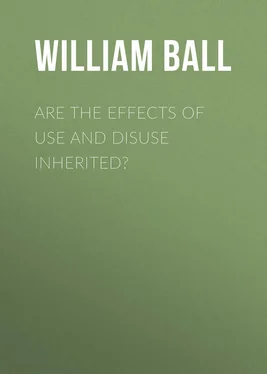William Ball - Are the Effects of Use and Disuse Inherited?
Здесь есть возможность читать онлайн «William Ball - Are the Effects of Use and Disuse Inherited?» — ознакомительный отрывок электронной книги совершенно бесплатно, а после прочтения отрывка купить полную версию. В некоторых случаях можно слушать аудио, скачать через торрент в формате fb2 и присутствует краткое содержание. Жанр: foreign_antique, foreign_prose, на английском языке. Описание произведения, (предисловие) а так же отзывы посетителей доступны на портале библиотеки ЛибКат.
- Название:Are the Effects of Use and Disuse Inherited?
- Автор:
- Жанр:
- Год:неизвестен
- ISBN:нет данных
- Рейтинг книги:5 / 5. Голосов: 1
-
Избранное:Добавить в избранное
- Отзывы:
-
Ваша оценка:
- 100
- 1
- 2
- 3
- 4
- 5
Are the Effects of Use and Disuse Inherited?: краткое содержание, описание и аннотация
Предлагаем к чтению аннотацию, описание, краткое содержание или предисловие (зависит от того, что написал сам автор книги «Are the Effects of Use and Disuse Inherited?»). Если вы не нашли необходимую информацию о книге — напишите в комментариях, мы постараемся отыскать её.
Are the Effects of Use and Disuse Inherited? — читать онлайн ознакомительный отрывок
Ниже представлен текст книги, разбитый по страницам. Система сохранения места последней прочитанной страницы, позволяет с удобством читать онлайн бесплатно книгу «Are the Effects of Use and Disuse Inherited?», без необходимости каждый раз заново искать на чём Вы остановились. Поставьте закладку, и сможете в любой момент перейти на страницу, на которой закончили чтение.
Интервал:
Закладка:
ADVERSE CASE OF NEUTER INSECTS
Mr. Spencer also holds that most mental phenomena, especially where complex or social or moral, can only be explained as arising from use-inheritance, which becomes more and more important as a factor of evolution as we advance from the vegetable world and the lower grades of animal life to the more complex activities, tastes, and habits of the higher organizations (preface, and p. 74). But there happens to be a tolerably clear proof that such changes as the evolution of complicated structures and habits and social instincts can take place independently of use-inheritance. The wonderful instincts of the working bees have apparently been evolved (at least in all their later social complications and developments) without the aid of use-inheritance – nay, in spite of its utmost opposition. Working bees, being infertile "neuters," cannot as a rule transmit their own modifications and habits. They are descended from countless generations of queen bees and drones, whose habits have been widely different from those of the workers, and whose structures are dissimilar in various respects. In many species of ants there are two, and in the leaf-cutting ants of Brazil there are three , kinds of neuters which differ from each other and from their male and female ancestors "to an almost incredible degree." 11 11 Origin of Species , pp. 230-232; Bates's Naturalist on the Amazons . Darwin is "surprised that no one has hitherto advanced the demonstrative case of neuter insects, against the well-known doctrine of inherited habit, as advanced by Lamarck." As he justly observes, "it proves that with animals, as with plants, any amount of modification may be effected by the accumulation of numerous, slight, spontaneous variations, which are in any way profitable, without exercise or habit having been brought into play. For peculiar habits confined to the workers or sterile females, however long they might be followed, could not possibly affect the males and fertile females, which alone leave any descendants." Some slight modification of these remarks, however, may possibly be needed to meet the case of "factitious queens," who (probably through eating particles of the royal food) become capable of producing a few male eggs.
The soldier caste is distinguished from the workers by enormously large heads, very powerful mandibles, and "extraordinarily different" instincts. In the driver ant of West Africa one kind of neuter is three times the size of the other, and has jaws nearly five times as long. In another case "the workers of one caste alone carry a wonderful sort of shield on their heads." One of the three neuter classes in the leaf-cutting ants has a single eye in the midst of its forehead. In certain Mexican and Australian ants some of the neuters have huge spherical abdomens, which serve as living reservoirs of honey for the use of the community. In the equally wonderful case of the termites, or so-called "white ants" (which belong, however, to an entirely different order of insect from the ants and bees) the neuters are blind and wingless, and are divided into soldiers and workers, each class possessing the requisite instincts and structures adapting it for its tasks. Seeing that natural selection can form and maintain the various structures and the exceedingly complicated instincts of ants and bees and wasps and termites in direct defiance of the alleged tendency to use-inheritance, surely we may believe that natural selection, unopposed by use-inheritance, is equally competent for the work of complex or social or mental evolution in the many cases where the strong presumptive evidence cannot be rendered almost indisputable by the exceptional exclusion of the modified animal from the work of reproduction.
Ants and bees seem to be capable of altering their habits and methods of action much as men do. Bees taken to Australia cease to store honey after a few years' experience of the mild winters. Whole communities of bees sometimes take to theft, and live by plundering hives, first killing the queen to create dismay among the workers. Slave ants attend devotedly to their captors, and fight against their own species. Forel reared an artificial ant-colony made up of five different and more or less hostile species. Why cannot a much more intelligent animal modify his habits far more rapidly and comprehensively without the aid of a factor which is clearly unnecessary in the case of the more intelligent of the social insects?
ÆSTHETIC FACULTIES
The modern development of music and harmony (p. 19) is undeniable, but why could it only have been brought about by the help of the inheritance of the effects of use? Why are we to suppose that "minor traits" such as the "æsthetic perceptions" cannot have been evolved by natural selection (p. 20) or by sexual selection? Darwin holds that our musical faculties were developed by sexual preference long before the acquisition of speech. He believes that the "rhythms and cadences of oratory are derived from previously developed musical powers" – a conclusion "exactly opposite" to that arrived at by Mr. Spencer. 12 12 Descent of Man , pp. 573, 572, and footnote.
The emotional susceptibility to music, and the delicate perceptions needed for the higher branches of art, were apparently the work of natural and sexual selection in the long past. Civilization, with its leisure and wealth and accumulated knowledge, perfects human faculties by artificial cultivation, develops and combines means of enjoyment, and discovers unsuspected sources of interest and pleasure. The sense of harmony, modern as it seems to be, must have been a latent and indirect consequence of the development of the sense of hearing and of melody. Use, at least, could never have called it into existence. Nature favours and develops enjoyments to a certain extent, for they subserve self-preservation and sexual and social preference in innumerable ways. But modern æsthetic advance seems to be almost entirely due to the culture of latent abilities, the formation of complex associations, the selection and encouragement of talent, and the wide diffusion and imitation of the accumulated products of the well-cultivated genius of favourably varying individuals. The fact that uneducated persons do not enjoy the higher tastes, and the rapidity with which such tastes are acquired or professed, ought to be sufficient proof that modern culture is brought about by far swifter and more potent influences than use-inheritance. Neither would this hypothetical factor of evolution materially aid in explaining the many other rapid changes of habit brought about by education, custom, and the changed conditions of civilization generally. Powerful tastes – as is incontestably shown in the cases of alcohol and tobacco – lie latent for ages, and suddenly become manifest when suitable conditions arise. Every discovery, and each step in social and moral evolution, produces its wide-spreading train of consequences. I see no reason why use-inheritance need be credited with any share in the cumulative results of the invention of printing and the steam-engine and gunpowder, or of freedom and security under representative government, or of science and art and the partial emancipation of the mind of man from superstition, or of the innumerable other improvements or changes that take place under modern civilization.
Mr. Spencer suggests an inquiry whether the greater powers possessed by eminent musicians were not mainly due to the inherited effect of the musical practice of their fathers (p. 19). But these great musicians inherited far more than their parents possessed. The excess of their powers beyond their parents' must surely be attributed to spontaneous variation; and who shall say that the rest was in any way due to use-inheritance? If, too, the superiority of geniuses proves use-inheritance, why should not the inferiority of the sons of geniuses prove the existence of a tendency which is the exact opposite of use-inheritance? But nobody collects facts concerning the degenerate branches of musical families. Only the favourably varying branches are noticed, and a general impression of rapid evolution of talent is thus produced. Such cases might be explained, too, by the facts that musical faculty is strong in both sexes, that musical families associate together, and that the more gifted members may intermarry. Great musicians are often astonishingly precocious. Meyerbeer "played brilliantly" at the age of six. Mozart played beautifully at four. Are we to suppose that the effect of the adult practice of parents was inherited at this early age? If use-inheritance was not necessary in the case of Handel, whose father was a surgeon, why is it needed to account for Bach?
Читать дальшеИнтервал:
Закладка:
Похожие книги на «Are the Effects of Use and Disuse Inherited?»
Представляем Вашему вниманию похожие книги на «Are the Effects of Use and Disuse Inherited?» списком для выбора. Мы отобрали схожую по названию и смыслу литературу в надежде предоставить читателям больше вариантов отыскать новые, интересные, ещё непрочитанные произведения.
Обсуждение, отзывы о книге «Are the Effects of Use and Disuse Inherited?» и просто собственные мнения читателей. Оставьте ваши комментарии, напишите, что Вы думаете о произведении, его смысле или главных героях. Укажите что конкретно понравилось, а что нет, и почему Вы так считаете.












